Mallika Naguran cruises to Pulau Tioman to dive and dine (hopefully seafood) with some volunteers bent on dealing with disappearing marine ecosystems.
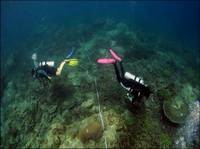
Surveying against 100m line.
What lies beneath can be pretty scary.
Once resplendent, the colourful garden of hard and soft corals - necklace of the seas some say – can now be called a grey cemetery. Eye witnesses report dead, broken, crushed and bleached corals around the world, but some ordinary folks in Malaysia are not content to let further destruction go by, not on their shores.
Here, a group of volunteer eco divers fight sea currents, seasickness and fatigue to note changes involved in marine
ecosystems over time through a comprehensive report to the authorities.
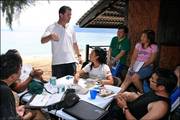
Julian Hyde trains volunteer divers on marine ecology.
Reef monitoring in Malaysia began in 2001. “Despite all the work that has been done to date, coral reef management in Malaysia could be more effective with better information,” says Julian Hyde, director of Reef Check Malaysia. Founded in the US in 1996, Reef Check is an international monitoring program that now conducts annual surveys in 86 countries.
Malaysia sits within the Coral Triangle. This is said to have the world’s richest and varied marine life encompassing Malaysia, Indonesia, the Philippines, Papua New Guinea, the Soloman islands, Fiji and Northern Australia.
Islands such as Pulau Tioman, Pulau Perhentian and Pulau Redang fringing West Malaysia’s east coast are names synonymous to top dive sites in the region. Or should I say, were.
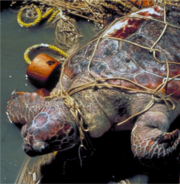
Harmful fishing methods trap harmless creatures.
I was told over dinner with the eco divers that 42% of Malaysia's coral reefs are set for doom with increasing damage through coastal development, sedimentation, marine-based pollution, overfishing and destructive fishing methods. Not forgetting warming temperatures, which slow cooks corals to death.
In 2007, 33 Reef Check surveys were conducted in Malaysia, covering 21 sites on the east coast. The results revealed a number of pressures impacting coral reefs negatively. “These include rapid development of tourism facilities, principally resorts, which increases sewage pollution, leading to the spread of coral-smothering algae,” says Shafinaz Suhaimi, sustainability advisor with Wild Asia.
Wild Asia, a conservation organization, has partnered Reef Check Malaysia to sustain marine monitoring activities through 2008. Together, they developed the Sustainable Island Programme (SIP) with the financial support of Sime Darby Plantations’ three-year Adopt a Reef program.
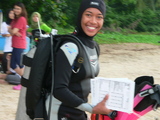
Suhaimi dives for data.
Suhaimi, also a trainer and leader of eco divers, adds that increasing visitor numbers are causing significant physical damage to the reefs. She reckons that Perhentian island has a 30% threshold for coral survival, while Redang and Tioman islands have 50%. If you think those numbers are bleak, hang on. “Currently only 4% of the world's marine ecosystem is left undamaged by human impact,” she adds.
What the SIP designs is to outline the stresses faced by the reefs and thereafter produce a reef conservation management plan. “This inevitably requires monitoring the condition of the marine ecosystem by surveying more dive sites and correlating it with what is happening on the islands itself,” says Suhaimi.
Since its launch in March 2008, the members of SIP are on high throttle to cover as much ground during the favourable dive season (typically March to October). In just one month, 26 certified eco divers from Malaysian Underwater have surveyed 20 reef sites over the three main islands.
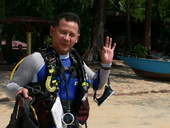
Eco diver Mohd wants results.
“We hope to eventually put up a report that will increase awareness of the value of coral reefs, its impact on tourism and on sustainable development,” says Mohamed Said, a keen volunteer diver with Malaysian Underwater, and a father of two living in Johor Bahru. Next weekend, he would drive up 300 miles to Pulau Redang for another underwater assessment.
One person who isn’t waiting for the report to be told what to do is Kaj, a dive operator and instructor at Tioman Dive Centre, a Reef Check partner. He and wife Barb stress care for the underwater life with students and leisure divers. At meals, Kaj opts not to eat fish as long as he lives on Tioman island.
“There’s no fish farm on the island, and there’s hardly any big fish in the sea here, so where do you think that plate of steamed fish comes from?” he asks pointing at the next table’s huge seafood fare. I order stir fried vegetables instead.
Marine ecosystems can be salvaged only with purposeful and immediate action by private and public sectors. Hopefully, Reef Check 2008 report is the last jolt needed to start concrete actions in replenishing the Malaysian coastline with vibrant reefs and hence, marine life.
Next: Stay tuned on how Biorock technology can help speed up coral growth, and possibly save the marine world.
Photos by Mallika Naguran, Ted Adnan and Izwar Zakri.
For more information, visit Reef Check Malaysia, Wild Asia, Malaysian Underwater and Tioman Dive Centre.